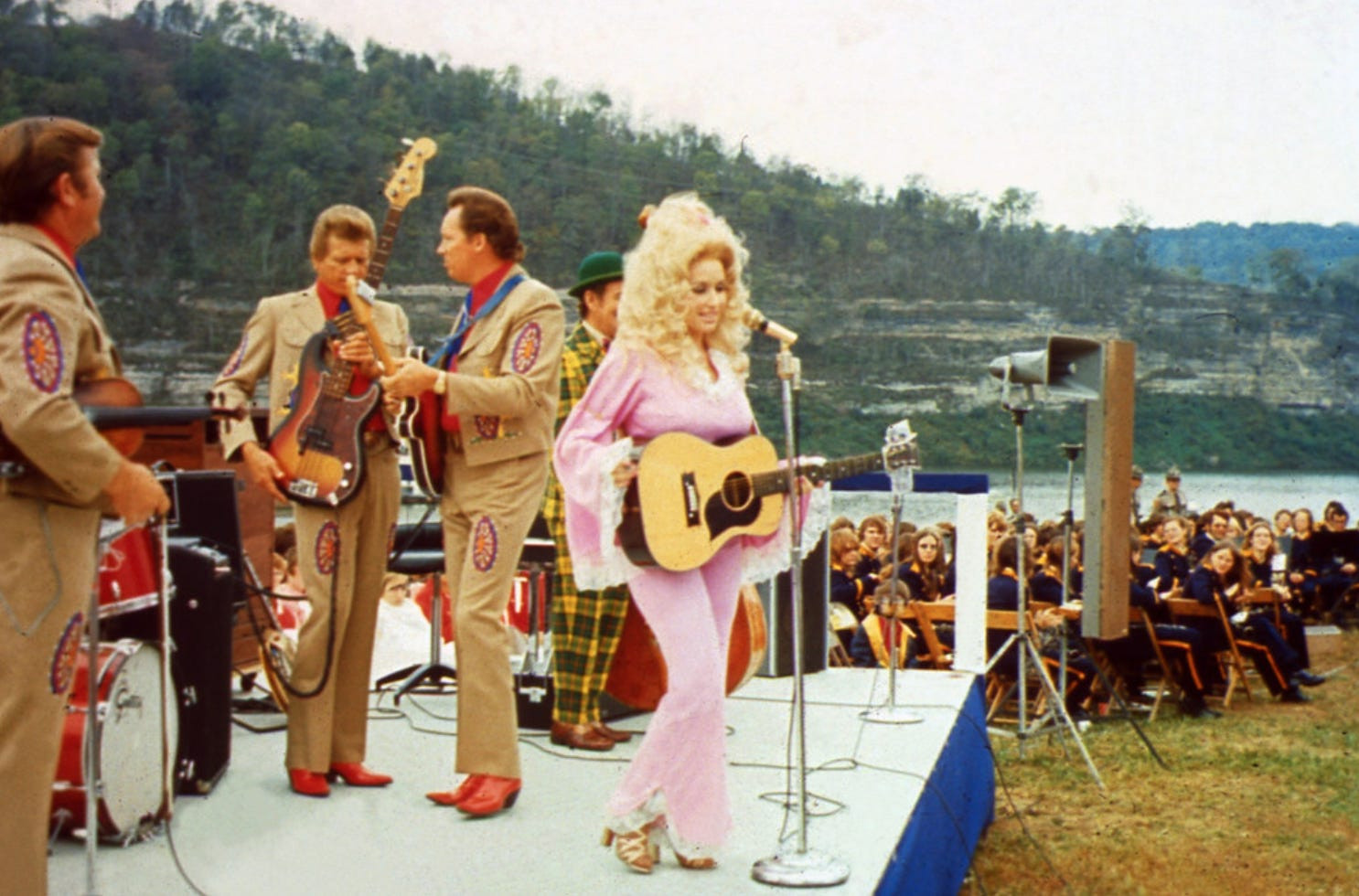Dolly Parton is a name synonymous with country music royalty, songwriting genius, and a heartwarming, down-to-earth persona. While she’s penned countless hits, two songs often rise to the top in discussions about her unparalleled talent: “Jolene” and “I Will Always Love You.” The story, possibly apocryphal, goes that she wrote both of these iconic tracks on the same day. But beyond the fascinating anecdote, lies the deeper story of enduring music, particularly the profound impact of the “I Will Always Love You Song.”
 Dolly Parton performs at 1973 dedication of Cordell Hull Dam
Dolly Parton performs at 1973 dedication of Cordell Hull Dam
Dolly Parton: A Songwriting Legend
To understand the significance of “i will always love you song,” it’s crucial to appreciate the artistry of Dolly Parton herself. Born into humble beginnings as the fourth of twelve children in rural Tennessee, Dolly’s journey is a testament to talent, hard work, and unwavering self-belief. She didn’t just become a country music star; she built an empire on the foundations of her songwriting prowess, captivating voice, and an undeniable charisma that transcends generations.
From her early days as a protégé of Porter Wagoner on “The Porter Wagoner Show,” Dolly’s star was clearly ascending. Wagoner provided a platform, but Dolly’s talent was the rocket fuel. By the early 1970s, she was ready to soar solo, her popularity reaching such heights that she was even invited to dedicate dams – a far cry from the usual trajectory of a country singer. This period of transition and burgeoning independence was fertile ground for creative expression, setting the stage for the birth of some of her most memorable songs.
The Allure of “Jolene”
The story of “Jolene” is well-worn but endlessly captivating. Inspired by a bank teller who caught her husband Carl Dean’s eye, “Jolene” is a masterclass in songwriting. The song isn’t about anger or jealousy; it’s a plea, a vulnerable acknowledgment of another woman’s captivating beauty. Musically, its distinct nylon-string guitar riff and haunting melody set it apart from typical country fare of the time. The song’s structure, beginning with the chorus, immediately draws the listener into Dolly’s heartfelt narrative.
“Jolene” possesses a timeless quality, evidenced by countless covers across genres. Miley Cyrus, with her matured vocal depth, delivered a powerful rendition. The White Stripes offered a bluesy, raw take, while more unconventional versions, like a screamo metal cover, surprisingly highlight the song’s inherent strength. Even remixed into a dance track, “Jolene” retains its core appeal, proving its versatility and enduring impact.
“I Will Always Love You”: A Song of Farewell and Forever Love
While “Jolene” is a story of potential romantic threat, “i will always love you song” delves into the bittersweet territory of farewell and enduring affection. This song, arguably Dolly’s most globally recognized, was written as a goodbye to Porter Wagoner as she decided to leave his show and pursue her solo career.
The Inspiration Behind “I Will Always Love You”
Contrary to Wagoner’s perhaps self-aggrandizing account of inspiring the song with a demand for love-themed material, Dolly’s narrative suggests a deeper, more personal motivation. It was about expressing gratitude and love for Wagoner while asserting her need for independence. “I Will Always Love You” is not just a breakup song in the romantic sense; it’s a song about recognizing the end of one chapter and the bittersweet necessity of moving on, even while holding onto deep affection.
The raw emotion in Dolly’s original recording is undeniable. It’s a song that resonates with profound sincerity, capable of “melting the coldest heart,” as fans have described. Its impact is deeply personal, becoming a soundtrack for life’s most poignant moments – played at bedsides, graduations, and whenever words of simple love fall short.
From Country to Global Phenomenon: Whitney Houston’s Touch
The song’s power was further amplified when Whitney Houston recorded her iconic version for “The Bodyguard” soundtrack in 1992. Houston transformed “i will always love you song” into a global pop and R&B anthem, showcasing her breathtaking vocal range and emotional depth. While rooted in country, the song’s universal theme of love and letting go transcended genre boundaries, reaching unprecedented audiences.
Houston’s rendition became definitive for many, introducing “i will always love you song” to a new generation and cementing its place in popular culture history. Dolly herself acknowledged Houston’s ownership of the version, famously saying, “It’s her record, but it’s my song. It didn’t sound like that when I had it. She made me rich!”
A Savvy Business Move
An interesting footnote to the “i will always love you song” story is Dolly’s shrewd business decision regarding Elvis Presley. “The King” himself wanted to record the song after hearing Dolly’s version, a testament to its immediate appeal. However, Colonel Tom Parker, Presley’s manager, demanded half of the publishing rights. Dolly, despite her admiration for Elvis, refused.
This seemingly difficult decision proved incredibly prescient. By retaining her publishing rights, Dolly reaped the full financial rewards of Whitney Houston’s massive hit years later. It was a savvy move that underscored not only her artistic talent but also her business acumen, ensuring the enduring legacy and financial success of “i will always love you song.”
Two Classics, One Day? The Myth and the Message
The anecdote of Dolly writing both “Jolene” and “i will always love you song” on the same day adds to the mystique surrounding her songwriting process. While the exact timeline might be embellished or slightly inaccurate, the essence of the story rings true. Dolly is known for her prolific songwriting, often jotting down ideas on napkins and amassing thousands of unreleased songs.
The story of the cassette tape containing early versions of both songs suggests a period of intense creativity in the early 1970s. Whether penned on the same day or within a short span, the proximity in their creation highlights Dolly’s extraordinary creative output during that era.
Ultimately, the “same day” story, true or not, serves a larger point: Dolly Parton’s genius lies in her consistent act of creation. She doesn’t overthink or over-optimize; she simply writes. Her prolific nature increases the chances of brilliance emerging, as evidenced by these two timeless classics. She embodies the idea that action and consistent effort often outweigh the pursuit of perfect productivity.
 Dolly Parton smiling warmly
Dolly Parton smiling warmly
The Lasting Power of Dolly’s Songs
In conclusion, while the productivity gurus might point to the “same day” anecdote as proof of a hyper-efficient creative process, the real takeaway from Dolly Parton’s story is the power of consistent creation. “Jolene” and “i will always love you song,” whether born on the same day or not, are testaments to her songwriting genius, emotional depth, and ability to connect with universal human experiences.
“I will always love you song,” in particular, has transcended its country origins to become a global anthem of love and farewell. From Elvis’s interest to Whitney Houston’s iconic rendition, and its continued resonance in countless personal moments, the song’s enduring legacy is a powerful reminder of the magic that happens when raw talent meets relentless creativity. Dolly Parton, with her disarming humility, might downplay her genius, but the world continues to sing along to the masterpieces she’s gifted us, proving otherwise, time and time again.
